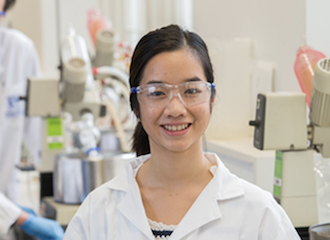Undergraduate research projects
Undertaking a research project is a fantastic way to develop practical scientific skills. It will also provide valuable experience to students considering honours, masters or a PhD in Science.
SCIE30001 Science Research Project
The Science Research Project is an individual program of supervised research in which the student, in consultation with a supervisor, contributes to the design, execution and presentation of a research project.
The project may be ‘stand-alone’ or part of a larger research program being undertaken by the supervisor. The specific details of the project, including its scope and the compilation, analysis and presentation of the results, are negotiated with the supervisor and, as appropriate, the Science Research Project Coordinator(s).
You can undertake a project in most disciplines within the Faculty of Science, and should approach a potential supervisor within a discipline area that is aligned to your research interest. You will receive feedback on progress through ongoing consultation with your supervisor.
This subject provides an opportunity for students to gain first-hand experience of scientific research, and is intended for undergraduate students who have achieved excellent results in the discipline related to the project. Undertaking the Science Research Project provides invaluable insights for students considering a career in scientific research.
Application process
1. Discuss potential projects with the supervisor
To enrol in this subject, you will need to find an academic willing to act as your supervisor. This requires initiative on your part because we cannot predict who has the resources or capacity to offer a project at any particular time. So the first step is to identify some potential supervisors whose expertise aligns with your interests.
There are several avenues for discovering who is doing what research at Melbourne: for example, you can search ‘Find an expert’; you can read the research pages of the relevant School; and you can recall which classes you found really interesting and identify the lecturer that gave those classes.
Once you've gathered a list of potential supervisors, you should reach out to them to inquire about their availability for supervising a research project. It’s a good idea to describe the areas of research that interest you, and perhaps mention which of their research questions (or published papers) you find especially interesting. It’s also helpful to attach a copy of your academic record, since this reveals your discipline expertise. If they are available, you can then arrange a suitable time for a meeting. While the meeting is an important way of discovering what projects might be available, it's also an important opportunity to work out whether you can work well with this person (and they are probably doing the same thing).
When you have found someone willing to be your supervisor, you can initiate your enrolment application, by following Step 2.
If you are unable to find a suitable supervisor, despite following the steps outlined above, then feel free to contact the relevant local coordinator for discipline-specific issues, or the coordinator for more general concerns.
-
BioSciences
- Ecology and Evolutionary Biology of Plants: Associate Professor Andrew Drinnan
- Molecular, Cellular and Developmental Biology: Professor Alex Andrianopoulos
- Ecology and Evolutionary Biology of Animals: Professor Mark Elgar
-
Chemistry
Contact: Professor Trevor Smith
Students should consult with the School of Chemistry about enrolment in either SCIE30001 Science Research Project or the alternative subject CHEM30013 Chemical Research Project.
-
Agriculture, Food and Ecosystem Sciences
- Ecosystem and Forest Sciences, coordinator: Associate Professor Christopher Weston
- Agriculture and Food Sciences, coordinator: Dr Antanas Spokevicius
-
Geography, Earth and Atmospheric Sciences
Earth and Atmospheric Sciences : Professor Ralf Haese.
Geography : Professor Russell Drysdale.
-
Mathematics and Statistics
Contact: Dr Diarmuid Crowley
Students should also investigate Third-year opportunities in Mathematics and Statistics.
-
Physics
Contact: Associate Professor Matthew Dolan.
-
Melbourne Veterinary School
Coordinator: Associate Professor Carol Hartley
-
Other disciplines
If you are interested in a SCIE30001 project in a discipline outside the Faculty of Science, you will need to discuss potential projects with staff from the relevant school. For assistance you can contact the relevant local area coordinator:
- Computing and Information Technology, Associate Professor Antonette Mendoza
- Electrical and Electronic Engineering, Professor Christopher Manzie
- Infrastructure Engineering, Professor Andrew Western
- Mechanical Engineering, Professor Jason Monty
- Biomedical Engineering, Professor Leigh Johnston
- Chemical Engineering, A/Prof Kathryn Mumford
- Psychological Sciences, Professor Rob Hester
2. Complete the Science Research Project Application via the Application Portal
This form must be initiated by the student and will be signed off by the supervisor, relevant discipline coordinator and subject coordinator.
Firstly, connect to the University VPN. Then click the "Application Portal' below and log in using your Unimelb Username and Password. Reminder to indicate that you are applying to the Faculty of Science. Once logged in, you can find user guides for more information on how to navigate the portal and complete your application.
Application Portal
The application system will update you when the application has been lodged and when it has been approved.
Application Dates
Applications for the coming year (including Summer) will open when the re-enrolment period opens in November. To ensure timely enrolment, applications should be lodged at least 2 weeks before the start of the relevant semester.
BIOM30003 Biomedical Science Research Project
If you are interested in completing a research project in the Biomedical Science disciplines, please visit the Biomedical Science page for information.
The Science Research Project was an awesome opportunity to see what goes on in the day-to-day life of a researcher. It gave me an extra push towards further study, and I can now definitely imagine myself as a researcher. Sonia Poetrodjojo, Bachelor of Science with a major in Chemistry
